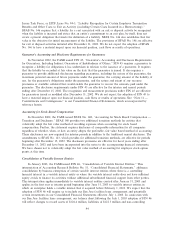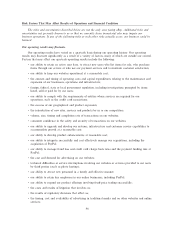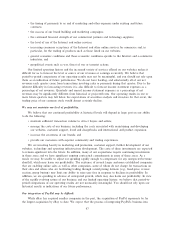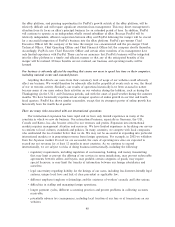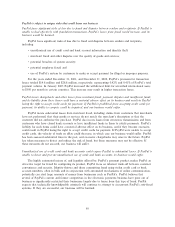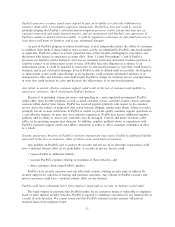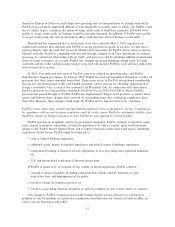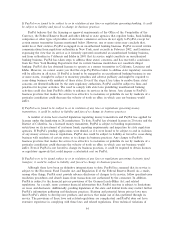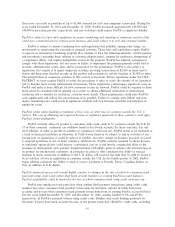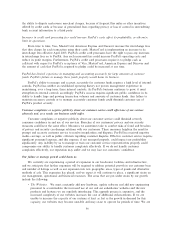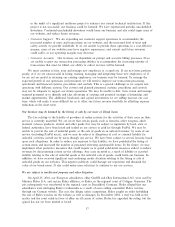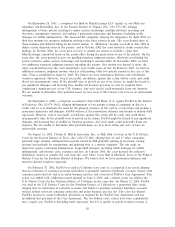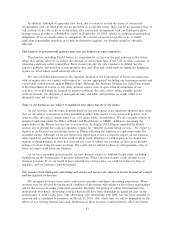eBay 2002 Annual Report Download - page 55
Download and view the complete annual report
Please find page 55 of the 2002 eBay annual report below. You can navigate through the pages in the report by either clicking on the pages listed below, or by using the keyword search tool below to find specific information within the annual report.American Express or Discover could adopt new operating rules or interpretations of existing rules which
PayPal or its processors might Ñnd diÇcult or even impossible to comply with, in which case PayPal could
lose its ability to give customers the option of using credit cards to fund their payments. If PayPal were
unable to accept credit cards, its business would be seriously damaged. In addition, if PayPal were unable
to accept credit cards, the velocity of trade on eBay could decrease and our business would suÅer.
MasterCard has announced that a clariÑcation of its rules, eÅective May 1, 2002, requires each
commercial customer that regularly uses PayPal to accept payment for goods or services, to enter into a
contract directly with the bank that processes MasterCard transactions for PayPal and to agree to observe
MasterCard rules. PayPal is complying with this rule through changes to its User Agreement, its internal
processes, its contractual relationship with its credit card processor, and by obtaining additional information
about its larger customers. As a result, PayPal has changed the interrelationship among itself, its larger
customers and its credit card processing bank in ways that will increase PayPal's costs and may reduce the
attractiveness of its service.
In 2001, Visa indicated that some of PayPal's practices violated its operating rules, and PayPal
implemented changes in response. In January 2002, PayPal received correspondence through its credit card
processor that three issues remained unresolved. These issues relate to PayPal's international membership
fees, its fees for international credit card funded payments, and its process for obtaining authorization to
charge a customer's Visa account if the customer's ACH transfer fails. In connection with these issues,
PayPal's processor was assessed Ñnes totaling $130,000 by Visa in 2002, $110,000 of which PayPal's
processor has passed through to PayPal. PayPal has implemented changes to its practices to resolve these
issues, and believes these changes have resolved all outstanding issues that resulted in compliance Ñnes
from Visa. However, these changes could make the PayPal service less attractive to its customers.
PayPal's status under state, federal and international Ñnancial services regulation is unclear. Violation of
or compliance with present or future regulation could be costly, expose PayPal to substantial liability, force
PayPal to change its business practices or force PayPal to cease oÅering its current product.
PayPal operates in an industry subject to government regulation. PayPal currently is subject to some
states' money transmitter regulations, to federal regulations in its role as transfer agent and investment
adviser to the PayPal Money Market Fund, and to federal electronic fund transfer and money laundering
regulations. In the future, PayPal might be subjected to:
‚ state or federal banking regulations;
‚ additional states' money transmitter regulations and federal money laundering regulations;
‚ international banking or Ñnancial services regulations or laws governing other regulated industries;
or
‚ U.S. and international regulation of Internet transactions.
If PayPal is found to be in violation of any current or future regulations, PayPal could be:
‚ exposed to Ñnancial liability, including substantial Ñnes which could be imposed on a per
transaction basis and disgorgement of its proÑts;
‚ forced to change its business practices; or
‚ forced to cease doing business altogether or with the residents of one or more states or countries.
Any change to PayPal's business practices that makes the service less attractive to customers or
prohibits its use by residents of a particular jurisdiction could decrease the velocity of trade on eBay, in
which case our business would suÅer.
53



